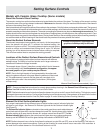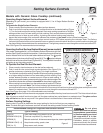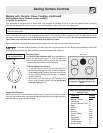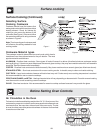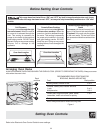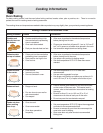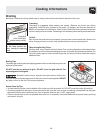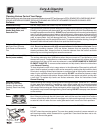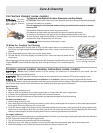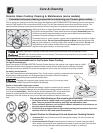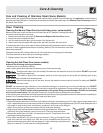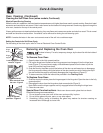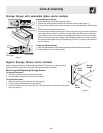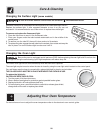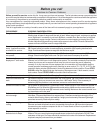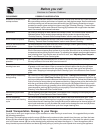
21
Before you call
Solutions to Common Problems
POSSIBLE CAUSE/SOLUTION
(1) Poor installation. Place oven rack in center of oven. Place a level on the oven rack. Adjust
leveling legs at base of range until the rack is level. When range is level, cooktop may appear
out of alignment if countertop is not level. (2) Weak, unstable floor. Be sure floor is level and
can adequately support range. Contact a carpenter to correct sagging or sloping floor. (3)
Kitchen cabinet misalignment may make range appear to be unlevel. Be sure cabinets are
square and have sufficient room for range clearance.
(1) Cabinets not square or are built in too tight. Contact a cabinet maker to correct the problem.
(2) Contact builder or installer to make appliance accessible. (3) Carpeting interferes with
range. Provide sufficient space so range can be lifted over carpet.
(1) Make sure cord/plug is tightly into outlet. (2) Service wiring is not complete. (3) Power
outage. Check house lights to be sure. Call your local electric company for service.
(1) This oven is equipped with a state of the art electronic oven controller. Among the many
features is a full time oven circuit diagnostics system. The controller constantly monitors the
internal circuitry as well as several crucial oven circuits to insure they are all operating
correctly. If at any time one of these systems fails, the controller will immediately stop the
current operation and beep continuously (flashing an error code of “F1, F2, F3”, or “F9” in the
controller display window. (2) Electronic control has detected a fault condition. Press STOP/
CLEAR to clear the display and stop the beeping. Reprogram oven. If fault remains, record
fault number. Press STOP/CLEAR and contact authorized servicer.
(1) Replace or tighten bulb. See Changing Oven Light in this owner’s Guide for instructions.
(1) Reset the breaker located underneath the control panel. (2) If the problem returns, verify if
the accessory that you connect uses more than 1800 watts. Verify if the accessory is
defective. (3)If the problem is not resolved, contact an authorized servicer.
(1) No power to the appliance. Check steps under “Entire Range or Oven Does Not Operate” in
this Before you Call checklist. (2) Incorrect control setting. Make sure the correct control is on
for the surface unit to be used. (3) Incorrect control setting. Make sure the correct control is on
for the surface unit to be used.
(1) Lightweight or warped pans used. Use only flat, evenly balanced, medium or heavyweight
cookware. Flat pans heat better than warped pans. Cookware materials and weight of the
material affect heating. Heavy-and medium- weight pans heat evenly. Because lightweight
pans heat unevenly, foods may burn easily.
(1) Foods with acids, such as tomatoes, if allowed to stand in/on bowls will cause corrosion.
Remove and wash drip bowls as soon as possible after spillover. (2) Normal environment.
Houses along sea coast are exposed to salt air. Protect bowls as much as possible from
direct exposure to salt air.
(1) Bottom surface of cookware extends beyond surface elements and touches cooktop
surface. This can cause high enough temperatures to discolor the drip bowls. DO NOT use
cookware of this type. Pan sizes should be matched to the size of the element. Replacement
drip bowls may be purchased from your dealer.
OCCURRENCE
Range is not level.
Cannot move appliance
easily. Appliance must be
accessible for service.
Entire range or oven does
not operate.
Oven control beeps and
displays an F error code.
Oven light does not work.
Electrical outlet does not
work.
Surface unit does not heat.
Surface units too hot or
not hot enough.
Drip bowls are pitting or
rusting.
Drip bowls turning color or
distorted out of shape.
Before you call for service,
review this list. It may save you time and expense. The list includes common occurrences that
are not the result of defective workmanship or materials in this appliance. You will be charged for a service call while the appliance
is in warranty if the problem is not caused by defective product workmanship or materials.
Your new appliance is a carefully engineered product. Many times, what appears to be a reason to call for service requires
nothing more than a simple adjustment you can easily make in your own home or is normal operating characteristic of appliance
under certain conditions.
This list is applicable to a variety of models; some of the items will not necessarily apply to your appliance.



